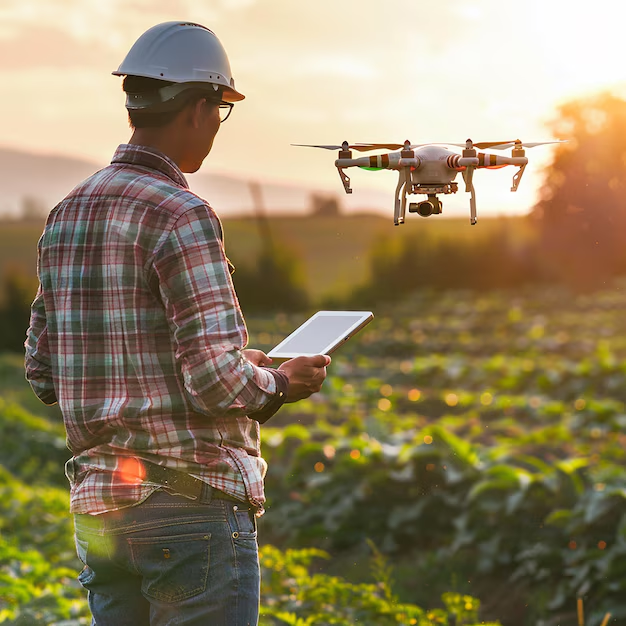The Netherlands, a global leader in agricultural innovation, has adopted the Internet of Things (IoT) to revolutionize farming practices, making them more efficient and sustainable. With its advanced use of smart technology, the country is setting an example for the world on how IoT can optimize farming, reduce environmental impact, and increase productivity. For South African (SA) farmers, learning from the Netherlands’ experience can be pivotal in tackling the unique challenges of agriculture in South Africa.
What is IoT in Farming?
The Internet of Things (IoT) refers to the network of connected devices that communicate and share data. In farming, IoT typically involves sensors, drones, and other smart equipment that monitor various aspects of farm operations. These devices collect data on soil moisture, weather conditions, crop health, livestock behavior, and more. The information is then processed and analyzed to help farmers make informed decisions, ultimately enhancing sustainability and efficiency.
IoT in the Netherlands: A Model for Sustainable Farming
In the Netherlands, the use of IoT technology has become integral to their farming practices, which focus on reducing waste, conserving resources, and boosting production. Smart sensors placed in the soil monitor moisture levels, preventing over-irrigation and helping farmers use water more efficiently. With the scarcity of water being a pressing issue in many regions of South Africa, this application of IoT can significantly reduce water wastage, a practice that should be adopted by SA farmers in areas facing water stress.
IoT-based systems also allow Dutch farmers to track fertilizer and pesticide application, ensuring they are used precisely when needed and in the right amounts. This reduces the environmental footprint of farming by minimizing chemical runoff and preserving soil health. For South African farmers, this level of precision could reduce the reliance on chemical inputs, contributing to a more sustainable farming model and reducing the impact on surrounding ecosystems.
Furthermore, IoT is being used to monitor livestock in real-time, tracking health, behavior, and even location. This helps farmers detect early signs of disease, preventing the spread of infections and improving overall herd management. For South Africa, where livestock farming is a significant part of the agricultural sector, IoT technology can increase animal welfare while maximizing productivity.
Key IoT Applications for South African Farmers
South African farmers can adopt several IoT applications from the Netherlands to improve sustainability and farm management:
- Smart Irrigation: IoT systems that monitor soil moisture levels can help farmers optimize water use. In areas where water is limited, smart irrigation systems can prevent water waste and ensure crops receive adequate hydration.
- Precision Agriculture: Using IoT devices to track crop health, soil conditions, and weather patterns can assist farmers in making more accurate decisions regarding planting, fertilizing, and harvesting. This precision not only boosts crop yields but also minimizes input costs and environmental impact.
- Livestock Monitoring: IoT sensors on animals can provide real-time data on their health and behavior. This can help SA farmers detect early signs of illness and optimize herd management practices, leading to healthier livestock and better production rates.
- Supply Chain Efficiency: IoT can also be used to improve the efficiency of the agricultural supply chain. Smart devices can track the condition of crops during transportation, ensuring products reach consumers in optimal condition, reducing waste and spoilage.
- Data-Driven Decision Making: By collecting and analyzing data from various sources, IoT systems give farmers valuable insights into their operations. This allows farmers to make informed decisions on resource allocation, pest control, and crop management, leading to more efficient farming practices.
Challenges and Opportunities for SA Farmers
While the potential for IoT in South African agriculture is immense, there are challenges to widespread adoption. These include high initial costs, limited access to reliable internet connectivity in rural areas, and the need for technical training to use IoT systems effectively. However, the South African government, along with agricultural organizations and tech startups, can help bridge these gaps by offering financial incentives, training programs, and infrastructure development.
The adoption of IoT technologies presents a long-term opportunity for South Africa to develop more sustainable and efficient farming practices. By leveraging these smart technologies, South African farmers can address the challenges of climate change, resource scarcity, and food security while improving productivity and reducing environmental impact.
The Netherlands has successfully demonstrated the transformative power of IoT in creating a more sustainable and efficient agricultural sector. For South African farmers, embracing these innovations can lead to more productive, environmentally responsible, and profitable farms. By learning from the Dutch example and adapting IoT technologies to local conditions, South Africa can enhance its agricultural practices and build a more sustainable future for farming.
Join 'Farmers Mag' WhatsApp Channel
Get the latest Farming news and tips delivered straight to your WhatsApp
CLICK HERE TO JOIN






